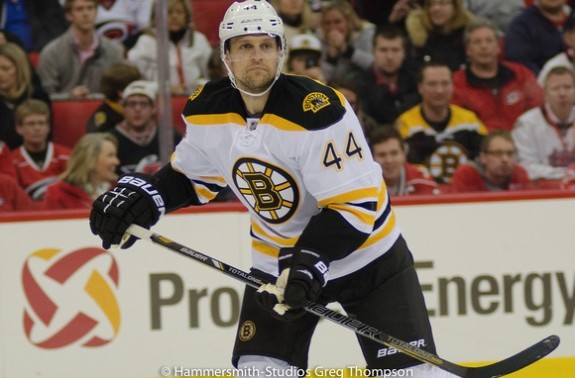In the weeks leading up to the NHL’s trade deadline, many people were convinced that the biggest need for the Boston Bruins was a veteran defenseman. Dennis Seidenberg was out for the season and Adam McQuaid’s injury situation was not improving, leaving the Bruins short-staffed on the back end.
Only looking at time on ice, McQuaid and Seidenberg have been vital to the Bruins success on route to the Stanley Cup Finals. In 2011, they averaged a combined 41 minutes and 40 seconds of ice time per time. They proceeded to average a combined 41 minutes and 46 seconds of ice time per game. Neither year saw substantial offensive contributions from McQuaid and Seidenberg, as they totaled three goals and 17 assists over the course of 88 games (45 for McQuaid, 43 for Seidenberg), but both players established a physical presence that helped to make the Bruins defense elite.

Working in the Bruins favor was the fact that their young defenseman (Dougie Hamilton, Torey Krug, Matt Bartkowski) have thrived in every offensive facet of the game. Defensively, it has been a work in progress. The defensive inconsistency led many to believe that the Bruins would target a defensive defenseman to balance out their group.
Trade Buzz
In the days prior to the Trade Deadline, rumors began to circulate that the Bruins had engaged in discussions about some big name players, many of which were forwards. The lure of players such as Marian Gaborik, Thomas Vanek, and Ryan Kesler generated a lot of excitement amongst the Bruins fan base, as the projected lines started to resemble those of an all-star team. Despite the fact the Bruins ranked as one of the top scoring teams in the league, the possibility of acquiring an all-star winger quickly went from a luxury to a perceived necessity for those following the team.
Substance
Minutes after the Trade Deadline had passed and the last few trade calls had been made, it was clear that the Bruins had not acquired a forward, let alone a big name forward. As a matter of fact, they only made two additions on Wednesday. The first transaction saw them claim defenseman Corey Potter off waivers from the Edmonton Oilers. The second, and more notable, move brought defenseman Andrej Meszaros to Boston from the Philadelphia Flyers in exchange for a third round pick.
The Bruins are hoping Meszaros, a veteran defenseman, can slot into their top 4, while Potter is expected to provide depth and experience to the defensive unit. These two moves, on paper, satisfy the needs of the Bruins to a T.
Clouded View?
The Bruins forward group is as healthy as they have been all year. Each of their four lines has developed chemistry, while clearly establishing their role on the team. The top line has elite offensive potential, with David Krejci centering power forwards Jarome Iginla and Milan Lucic. The second line is one of the best two-way lines in the game, centered by 2012 Selke Award winner Patrice Bergeron. The third line has shown a vast improvement since returning from the Olympic Break, as Loui Eriksson and Chris Kelly have put their injury woes behind them, while Carl Soderberg has emerged as a force in his first full season in the NHL. The fourth line has been clicking on all cylinders since the break, applying strong pressure on the forecheck and grinding other teams down. Barring an injury, there is no reason that a forward was an essential acquisition.
So why is it that so many fans are disappointed by the Bruins inability to close the deal for a forward?
An elite goal scorer is not the type of player that you add to improve your team’s depth. With that in mind, we can safely rule out potential injuries as an explanation for why the Bruins needed a forward. Even with the early struggles of Brad Marchand and the injuries to Loui Eriksson and Chris Kelly, the Bruins currently rank fourth in the league in goals per game, averaging a robust 3.13. That rules out lack of scoring as a reasonable explanation as well.
The Bruins maintained all of their valuable trade chips, while adding players that will help in this year’s playoff run. In the short-term and the long-term, the Bruins will be better off for making solid, albeit unremarkable, trades at this year’s deadline.
What do you think? Did the Bruins actually need Thomas Vanek or Marian Gaborik? Should they have pushed harder to acquire Alexander Edler or Christian Ehrhoff? Let me know in the comments or follow me on twitter @kirkvance.
… although they’re facing some tough cap issues as it is.
Ehrhoff